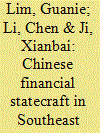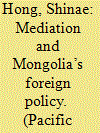|
|
|
Sort Order |
|
|
|
Items / Page
|
|
|
|
|
|
|
| Srl | Item |
| 1 |
ID:
185987


|
|
|
|
|
| Summary/Abstract |
Since 2013, the Belt and Road Initiative has become China’s signature foreign economic policy campaign. While there have been debates on the initiative’s implementation and implications, an emerging consensus suggests that the export of capital-intensive infrastructure is a key driving factor of China’s financial statecraft. For Southeast Asian countries, such Chinese efforts are useful in plugging their domestic infrastructure gaps, not least in the remote parts of their territory. Against this backdrop, this article examines arguably two of the most prominent Chinese infrastructure projects in Malaysia – the East Coast Rail Link (ECRL) and the Malaysia-China Kuantan Industrial Park (MCKIP). It posits three inter-related arguments. Firstly, unlike conventional analyses which commonly treat the Chinese state as a singular, unitary actor, both the central and provincial governments in China’s multi-layer state structure have played important roles and demonstrated different characteristics in Chinese infrastructure overture towards Malaysia. Secondly, one observes contrasting patterns of well-coordinated state-business relations in the ECRL project versus loose, decentralised state-business relations driven largely by Guangxi province and market forces for the MCKIP. Thirdly, the implementation of both the ECRL and the MCKIP has been heavily constrained by the political-institutional environment of Malaysia as the host country, illustrating that Chinese financial statecraft, in the form of infrastructure provision, generates considerably less impact than what popular rhetoric suggests.
|
|
|
|
|
|
|
|
|
|
|
|
|
|
|
|
| 2 |
ID:
185991


|
|
|
|
|
| Summary/Abstract |
Over the past decade, the small state of Mongolia has emerged as an important player in Northeast Asia through its mediation efforts. Driven by a desire for regional and global influence and prestige, Mongolia has sought to locate itself as a neutral intermediary in regional conflicts—in particular the Korean peninsula’s peace process, by hosting the “Ulaanbaatar Dialogue” starting in 2013. In this regional security dialogue initiative, Mongolia has proven itself to be a capable peace broker in easing tensions between the two parties, and, more crucially, it has made a constructive impact on the regional security architecture by building a functioning multilateral dialogue mechanism to support the Korean peninsula peace process after the halt of the six-party talks. Its success has been aided by its perceived impartiality in the conflict; its multilateral, activist, peace-oriented foreign policy portfolio; and its cordial external relations with regional countries, including both North and South Korea, and globally. This article seeks to contribute to the understanding of the varied abilities, strategies, and sources of advantage employed by small states to project power and raise their influence in regional affairs by exploring the case of Mongolia.
|
|
|
|
|
|
|
|
|
|
|
|
|
|
|
|
| 3 |
ID:
185984


|
|
|
|
|
| Summary/Abstract |
This article examines the relationship between US missile defense and the US-China security dilemma dynamics by developing the concept of diffuse signaling involving the Korean peninsula. We argue that the US’ efforts to bolster deterrence against North Korea’s growing threats through missile defense have resulted in China’s countermeasures of enhancing survivability and penetrability of its second-strike capability, leading to downward spirals of tensions between Beijing and Washington. We explain how three structural factors – geography, the US alliance system, and nuclear asymmetry – have made diffuse signaling salient, thus making it very challenging for the United States to reassure China even when its actions targeted North Korea. The article empirically shows the action-reaction process through which China and the US have come to experience the aggravation of the security dilemma over the Korean peninsula.
|
|
|
|
|
|
|
|
|
|
|
|
|
|
|
|
| 4 |
ID:
185988


|
|
|
|
|
| Summary/Abstract |
Drawing on the insights of the constructivist school approach, this article joins the debate on the effects of rising China in Asia. The existing scholarship devoted to no-material aspects of China’s rise focused either on China’s ‘soft power’ initiatives or their reception by certain audiences. In this article, rising China and its governance model, are construed as a form of productive power, one that is expected to bring about not only shifts in material relations and perceptions but also transformations in the national identities of countries in the region. This article focuses on South Korea and Thailand, two countries with fundamentally different political systems but a similar pattern of recent interactions with China. It analyzes the policymaking elites’ discourse and public attitudes and explores the productive effects of China’s rise on national identities in the two countries. This article argues that the impact of China’s rise on elites’ discourse has been largely negligible with narratives on kinship and historical ties being used by the elites mostly for instrumental reasons. At the same time, this article suggests that the recent shifts in public attitudes towards greater acceptance of authoritarian values observed in South Korea and Thailand, may be indicative of the productive effect of rising China on national identities in both countries.
|
|
|
|
|
|
|
|
|
|
|
|
|
|
|
|
| 5 |
ID:
185989


|
|
|
|
|
| Summary/Abstract |
Despite the striking similarities in strategic environment of Japan and South Korea, US deterrence through nonproliferation policy toward the two allies varied in terms of its measures applied: reward-based deterrence and threat-based deterrence. Using the critical junctures framework, this paper argues that 1) domestic structural circumstances of divided with idealist bias or unified with realist bias in two allies led to different local responses to US policy that signalled the level of credibility of US security guarantee; 2) intermediaries that played a critical role in promoting mutual trust and confidence have influenced the credibility and confidence on intra-alliance level; 3) this credibility and confidence had shaped the direction of the US deterrence strategy of reward-based deterrence for Japan and threat-based deterrence for South Korea.
|
|
|
|
|
|
|
|
|
|
|
|
|
|
|
|
| 6 |
ID:
185985


|
|
|
|
|
| Summary/Abstract |
The territorial dispute in the South China Sea (SCS) affecting China and several ASEAN countries has already resulted in drawn-out political tensions in the region. However, one aspect of the dispute is rarely discussed: its influence on Sino-Russian relations and its possible role as a case study in analysing the character of these relations. While Russia moves closer to China in the dispute it still refrains from support of its territorial claims and develops close relations with some of China’s regional opponents such as Vietnam and India. This article describes most recent Russian economic and political activity in the region involving these countries with the aim of clarifying whether the Russian approach to problems in the SCS can be understood as an attempt to balance, bandwagon or hedge against growing Chinese influence, or whether Moscow’s approach is guided by different considerations.
|
|
|
|
|
|
|
|
|
|
|
|
|
|
|
|
| 7 |
ID:
185990


|
|
|
|
|
| Summary/Abstract |
This article explores the consequences major power rivalries over connectivity investments have for small states in Asia and thereby contributes to a better understanding of small states’ strength and capabilities in an increasingly multipolar world. With reference to the literature on small states, field work, and interviews, the article explores Bangladesh’s remarkable success in reaping the benefits from relations with rivalling major powers over the past decade. Three explanatory factors stand out: first, Bangladesh’s ‘intrinsic’ value to major powers increased; second, its political leadership has been particularly adept in dealing with such major powers; and third, systemic factors – the number and kind of major powers with stakes in Bangladesh – has been beneficial. Thus, Bangladesh’s foreign policy responses suggest that the competitive nature of connectivity investments substantially improves the autonomy of recipient countries. Moreover, contrary to theoretical expectations, the intensification of major power rivalry so far has not constrained Bangladesh’s autonomy. Thus, the case study also exhibits infrastructure investments’ limitations as a power resource. Nonetheless, the potentially most beneficial cooperation schemes involving rivalling major powers have become less likely. Consequently, the case study dampens incipient hopes in turning competing connectivity schemes into major power positive-sum games.
|
|
|
|
|
|
|
|
|
|
|
|
|
|
|
|
|
|
|
|
|